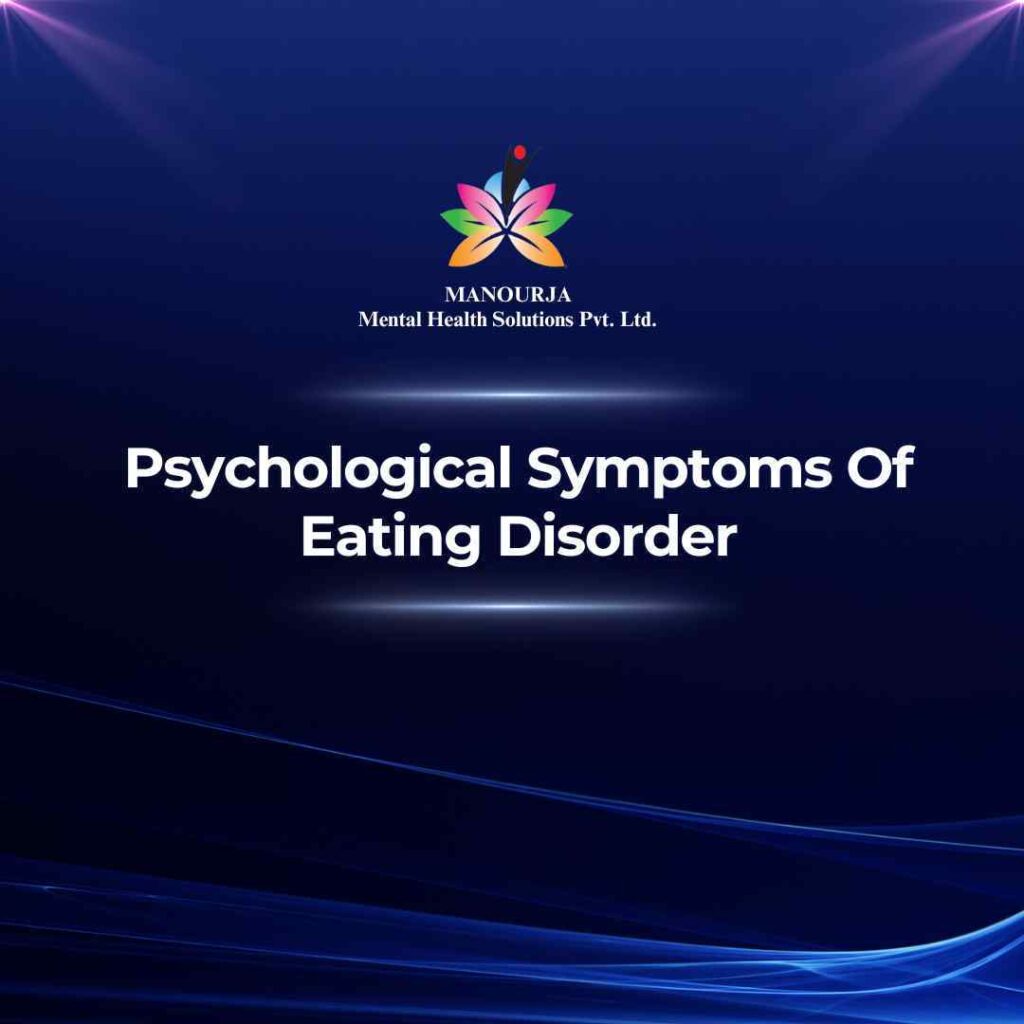Psychological Symptoms of Eating Disorder

Eating disorders are complex mental health conditions that manifest through a variety of psychological symptoms. These symptoms can profoundly affect an individual’s emotions, thoughts, and behaviors. Here’s a detailed look at the psychological symptoms associated with common eating disorders such as anorexia nervosa, bulimia nervosa, and binge-eating disorder:
Psychological Symptoms of Anorexia Nervosa
- Intense Fear of Gaining Weight: Despite being underweight, individuals may have a pervasive dread of weight gain and an unrealistic perception of their body size.
- Distorted Body Image: Individuals often have a distorted view of their bodies, believing they are overweight even when they are dangerously thin.
- Obsessive Calorie Counting and Restriction: Extreme focus on food, calories, nutrition, and dieting.
- Mood Swings: Significant emotional instability, which may include irritability, sadness, or anxiety, particularly surrounding meals or when faced with food.
- Withdrawal from Social Activities: Especially those involving food; avoidance of eating in public and isolation from friends and family.
Psychological Symptoms of Bulimia Nervosa
- Binge Eating: Consuming large amounts of food in short periods, often in secret.
- Feeling Out of Control: A sense of loss of control during bingeing episodes.
- Purging Behaviors: After bingeing, individuals engage in inappropriate compensatory behaviors such as self-induced vomiting, misuse of laxatives, diuretics, or excessive exercise.
- Shame and Guilt: Intense feelings of shame or guilt about bingeing and purging behaviors.
- Preoccupation with Body Shape and Weight: Obsession with weight and body shape, similar to those seen in anorexia nervosa.
Psychological Symptoms of Binge-Eating Disorder
- Recurrent Episodes of Binge Eating: Consuming unusually large amounts of food in a specific amount of time, typically two hours, coupled with a feeling of loss of control during the binge.
- Eating Past Fullness: Frequently eating until uncomfortably full.
- Eating When Not Physically Hungry: Regularly eating large amounts of food even when not hungry.
- Feelings of Distress: Episodes of binge eating are often accompanied by distress, disgust, depression, or guilt afterward.
- Secrecy Surrounding Eating: Eating alone due to embarrassment over the quantity of food consumed.
Common Psychological Features Across Eating Disorders
- Anxiety and Depression: High levels of anxiety and symptoms of depression are common across all types of eating disorders.
- Compulsive Behaviors: Obsessive-compulsive features related to food, calories, exercise, and body checking can occur in all eating disorders.
- Low Self-Esteem: Often, there is an underlying issue of low self-esteem and feelings of inadequacy.
- Social Isolation: Withdrawal from social interactions, activities, and relationships is frequently noted as the individual becomes more engrossed in their disorder.
Treatment Approaches
Psychological treatment is central to addressing eating disorders, typically involving:
- Cognitive Behavioral Therapy (CBT): The most commonly recommended therapy for eating disorders, focusing on identifying distorted thought patterns and behaviors and replacing them with healthier ones.
- Family-Based Therapy (FBT): Particularly effective for adolescents with anorexia nervosa, involving family members in treatment to support positive eating behaviors.
- Interpersonal Psychotherapy (IPT): Addresses interpersonal issues which can contribute to the development and maintenance of eating disorders.
- Medication: Such as antidepressants, may be used to treat underlying or associated anxiety and depression, though it’s not a standalone treatment for the eating disorders themselves.
Addressing the psychological symptoms of eating disorders is crucial as these aspects drive the behaviors and significantly impact recovery. Treatment is often a long-term process involving a multidisciplinary approach, including mental health professionals, dietitians, and medical providers.
At MANOURJA, we believe in the transformative power of counseling. Our experienced therapists offer a safe and supportive space where you can explore your thoughts, emotions, and challenges. Through personalized counselling sessions, we’ll work together to develop coping strategies, build resilience, and achieve lasting positive change. Discover the path to a healthier, happier you with MANOURJA counselling services.
MANOURJA Rehabilitation Services
At MANOURJA, we’re dedicated to helping you in rebuild your life, after difficult times. Our rehabilitation services focus on understanding what you need to move forward, whether you’re recovering from addiction, trauma, or any psychological – social challenges. We create personalized plans, that are all about helping you, regain your strength and find hope again. With a caring team by your side, you’ll have the support to make real progress and take steps toward a brighter, healthier future.
